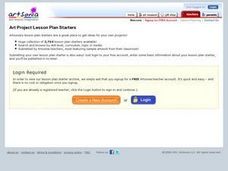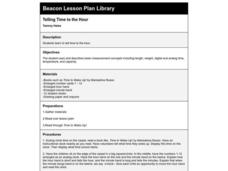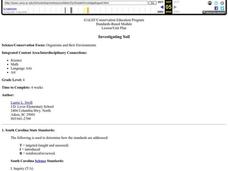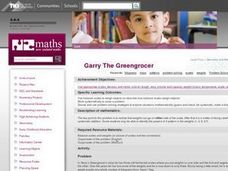Curated OER
Trail Mix
Third graders, given the price of different ingredients, make a trail mix of five different items without exceeding their budget of five dollars. They choose between pretzels, M&M's, twizzlers, popcorn, etc,. Each student practices...
Curated OER
Multiple Intelligences
Students investigate Gardner's theory of multiple intelligences. In this research based lesson plan, students compare theories of intelligences and examine the implications of using these theories in schools and society.
Curated OER
Medieval Castles
Second graders design a scale model of a medieval castle and its surroundings including the following items: castle, moat, bailey, drawbridge, turrets, dungeon, grounds, and outer walls. A perfect lesson plan for those kids who are...
Curated OER
Trains
Students compare the lengths of the train through calculation. This calculation can be done by knowing the values of the rods. Students use problem solving to get the answer to the problem before them.
Curated OER
Food Chains And Webs
Students investigate the concept of soil and all its components. They collect samples from a local site and transplant it into a terrarium. Students identify the organic elements, clay ,silt, and other forms of debris. They also identify...
Curated OER
Student Power Use
High schoolers calculate the energy usage in their bedroom. In this physics lesson, students compare their energy consumption during school days and weekends. They recommend ways to save energy.
Curated OER
Relationships and Functions
Fifth graders describe patterns as relations and functions. In this patterning instructional activity, 5th graders analyze and continue patterns. Students understand how patterns relate to relations and functions.
Curated OER
Investigating Soil
Fourth graders swap local soil samples with another school and examine the differences. They research soil properties, identify organisms that live in soil, create and maintain a biome of soil decomposition and design a poster to present...
Curated OER
Weights
Students find an object that they estimate weighs 20g and check estimates on the balance scales. They read the problem and work in pairs focusing their understanding on the size of grams.
Curated OER
How Might Radon Affect Me?
Students participate in an experiment in which they discover the relationship between the lungs and radon. They identify the helpful and harmful aspects of radiation. They also research any illnesses related to exposure to radon gas.
Curated OER
A thousand seconds
Students use seconds, minutes, and hours. They then discuss the size of a thousand. After that they read time in digital or analogue form.
Curated OER
Estimating Volumes Of Household Containers
Learners engage in a the estimation of volume for household containers and focus upon the usage of the metric system. They practice identifying the shapes that seem familiar and match shapes with quantities. Students interact with others...
Curated OER
Parking Meters
Third graders are introduced to the problem with a short discussion about parking. They then solve with a partner. As they work ask questions that focus on the strategies they are using to make the calculations.
Curated OER
Garry The Greengrocer
Fourth graders are introduced to the problem by weighing objects on the balance scales. Use weights in both pans. (If you don't have access to scales use 2 containers and a child acting as the balance.) They then listen to the problem...
Curated OER
Energy Panel Hearings: "Your Town", Saskatchewan
Tenth graders access information to participate in a debate about whether a power plant should be placed in their town. They research an assigned point of view.
Curated OER
Rockets on a Shoestring Budgut
Students work together to create rockets on a budget. They discover the limitations that real engineers face when designing and testing their products. They discuss their findings to complete the lesson plan.
Curated OER
Adam's Watch
Third graders use their watches to tell the time while the teacher lists their responses on the board along with the reasons for them (set incorrectly, gain/lose time). They solve the problem in pairs and focus their thinking on the...

















